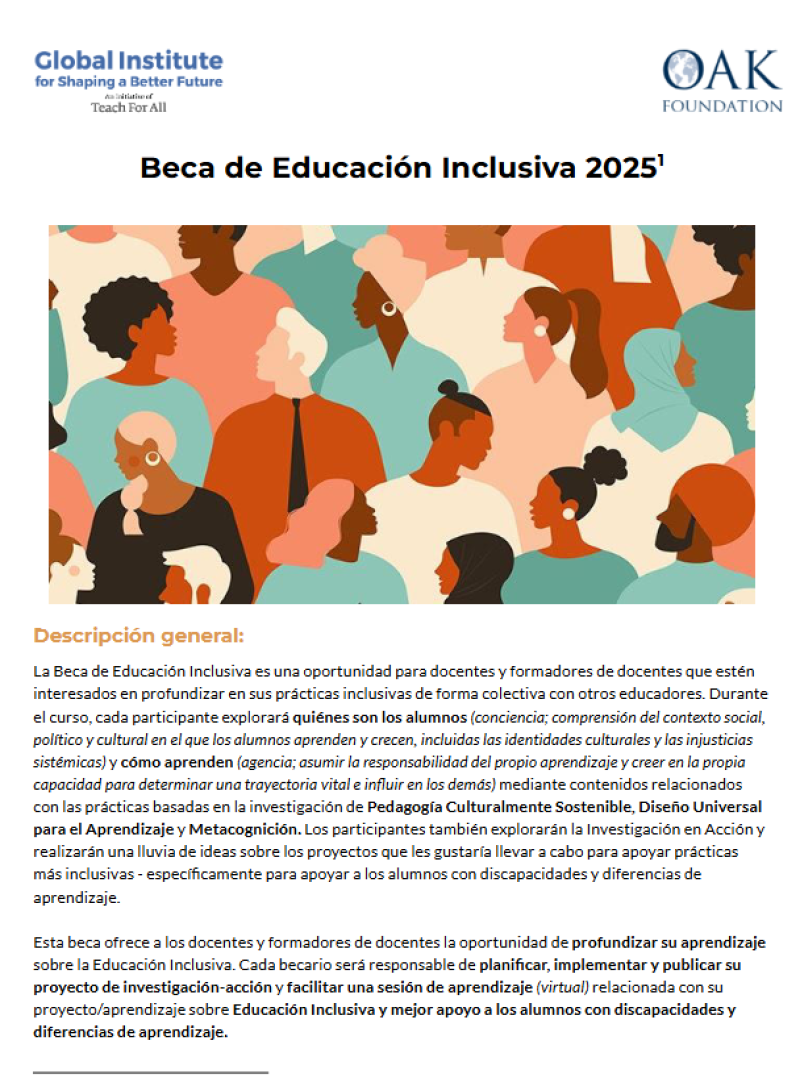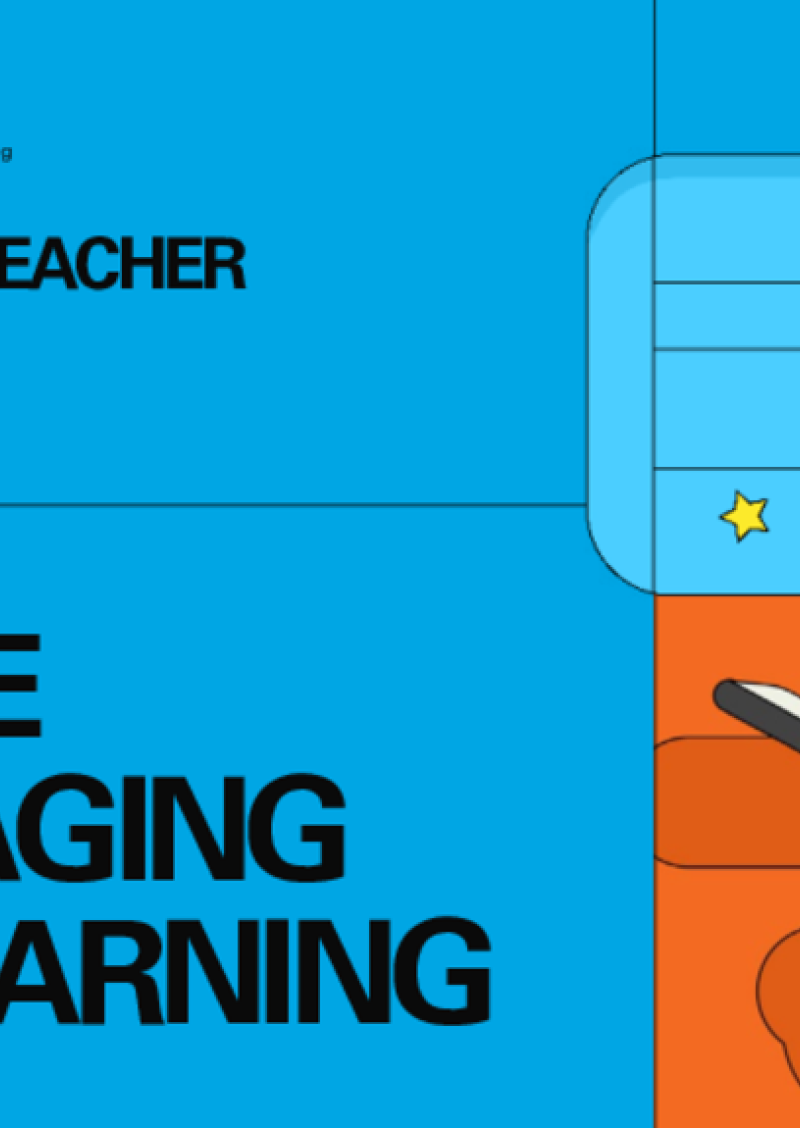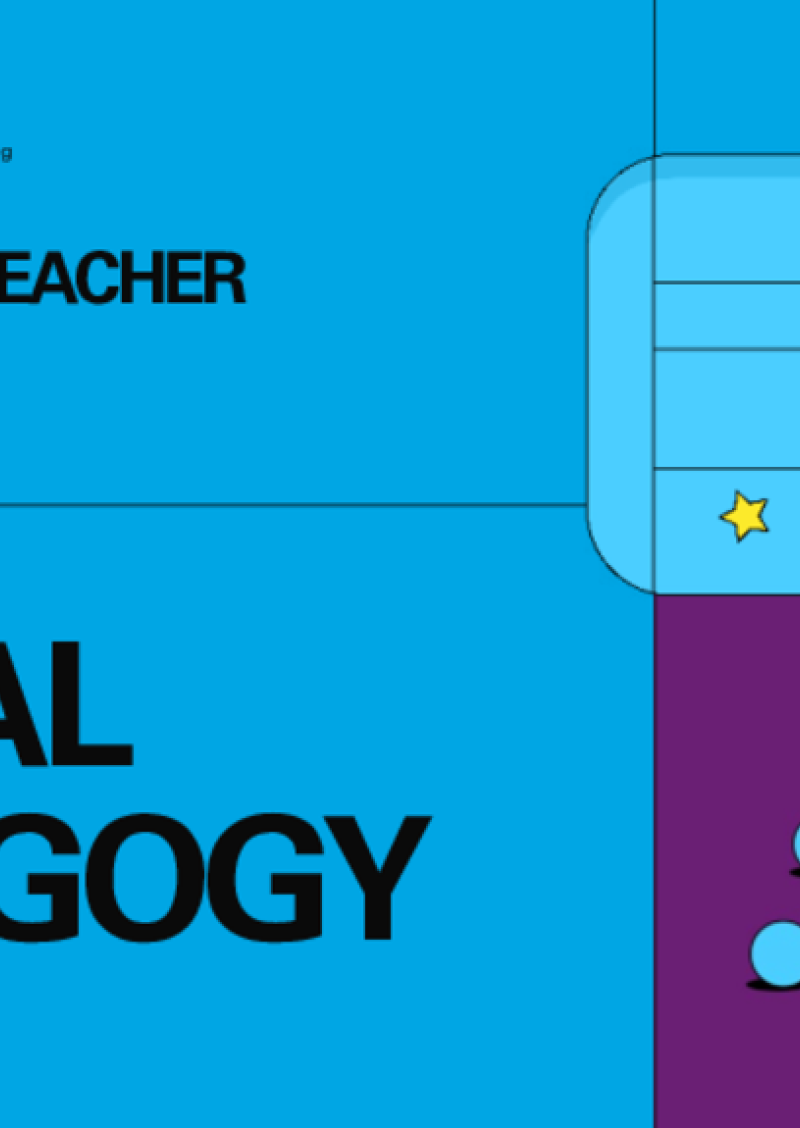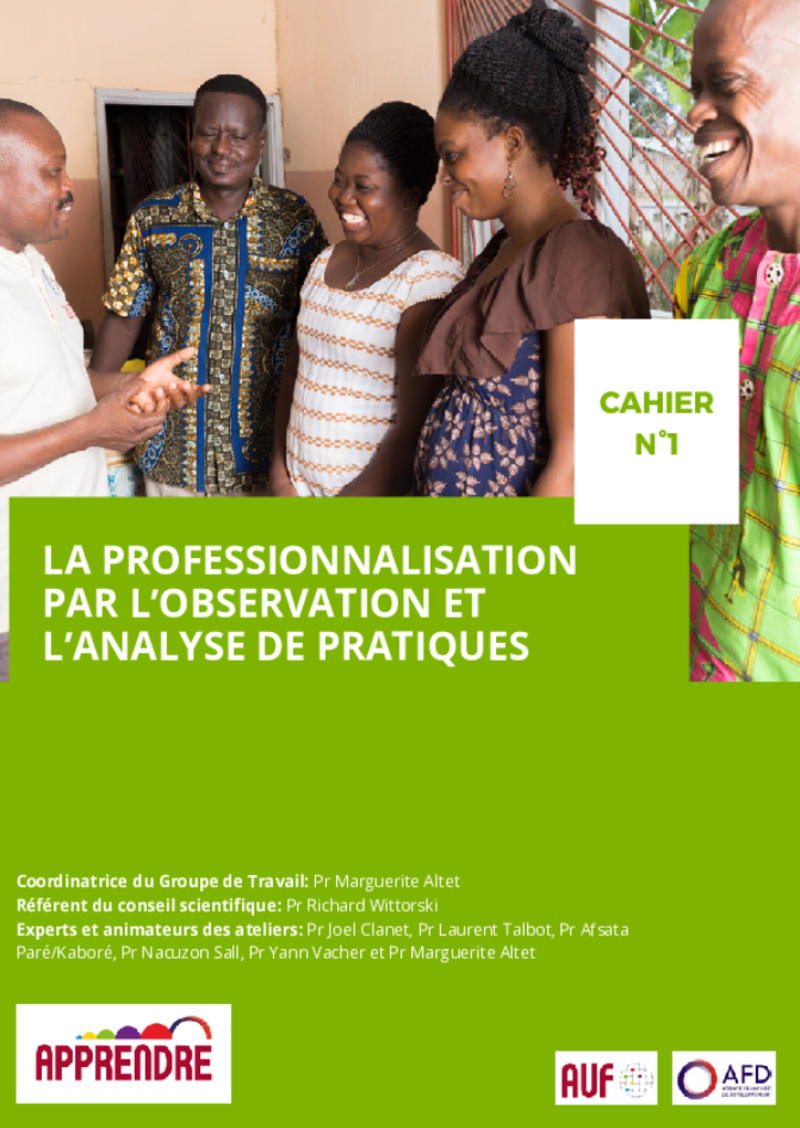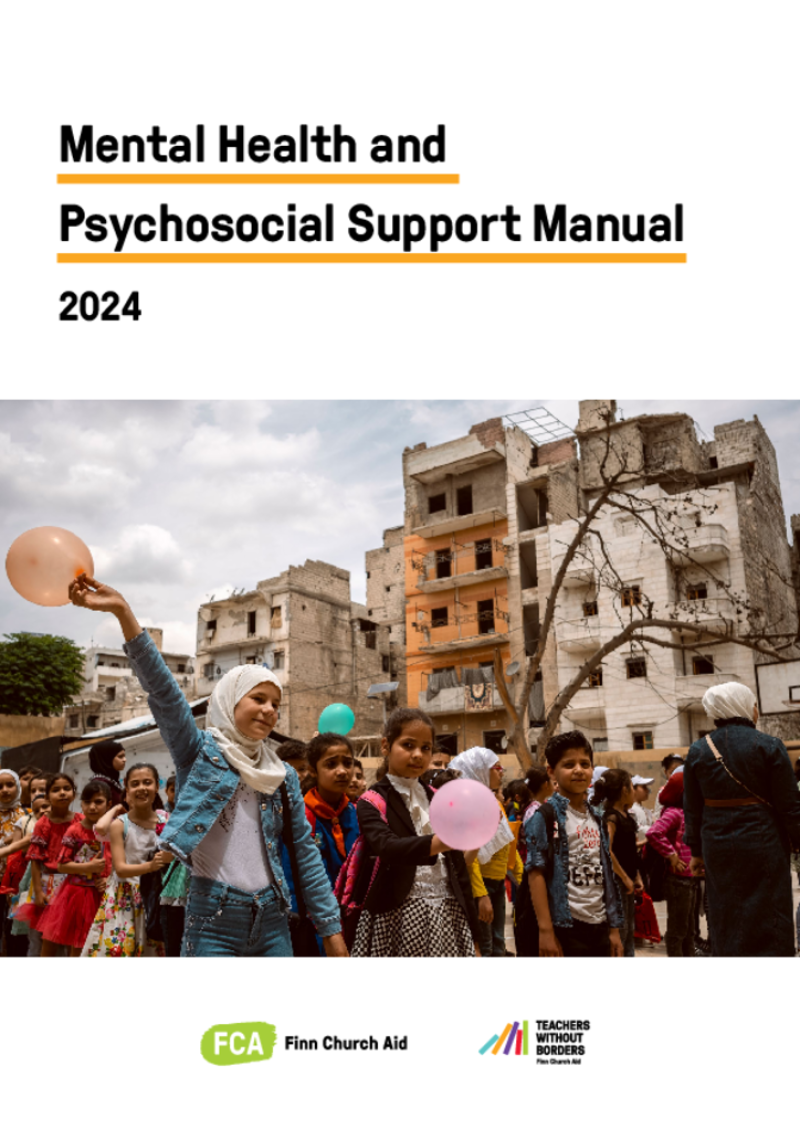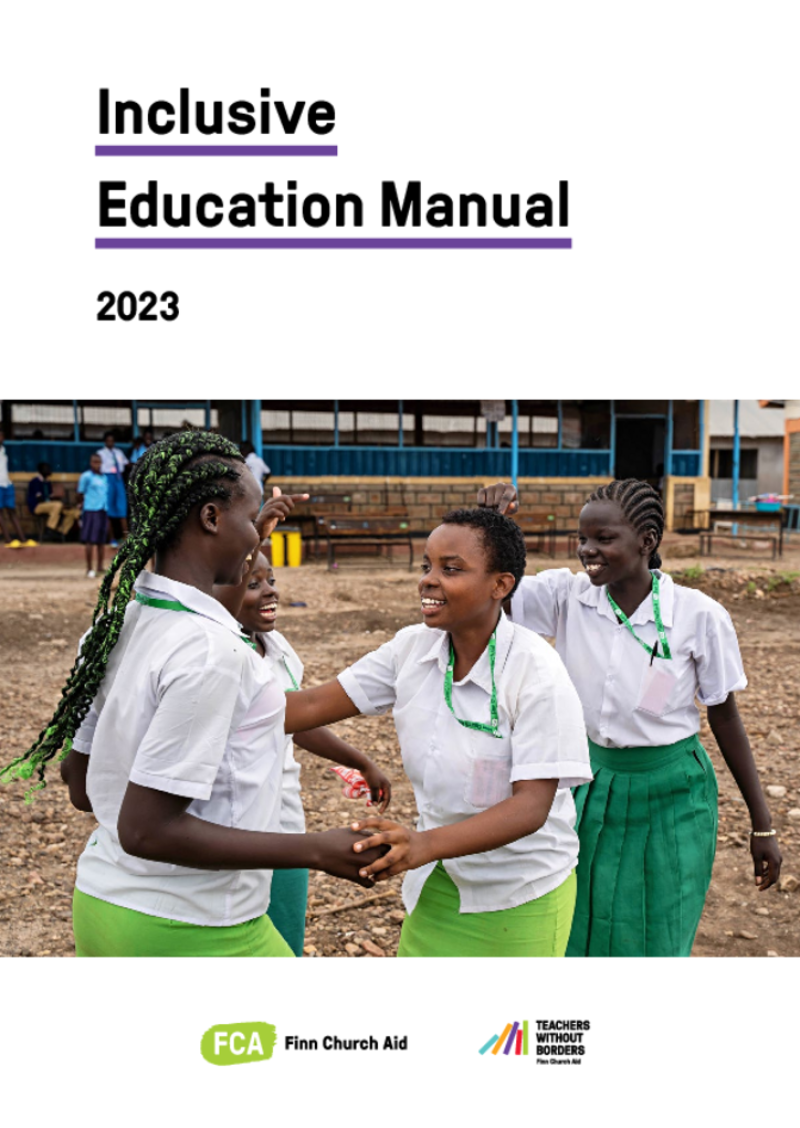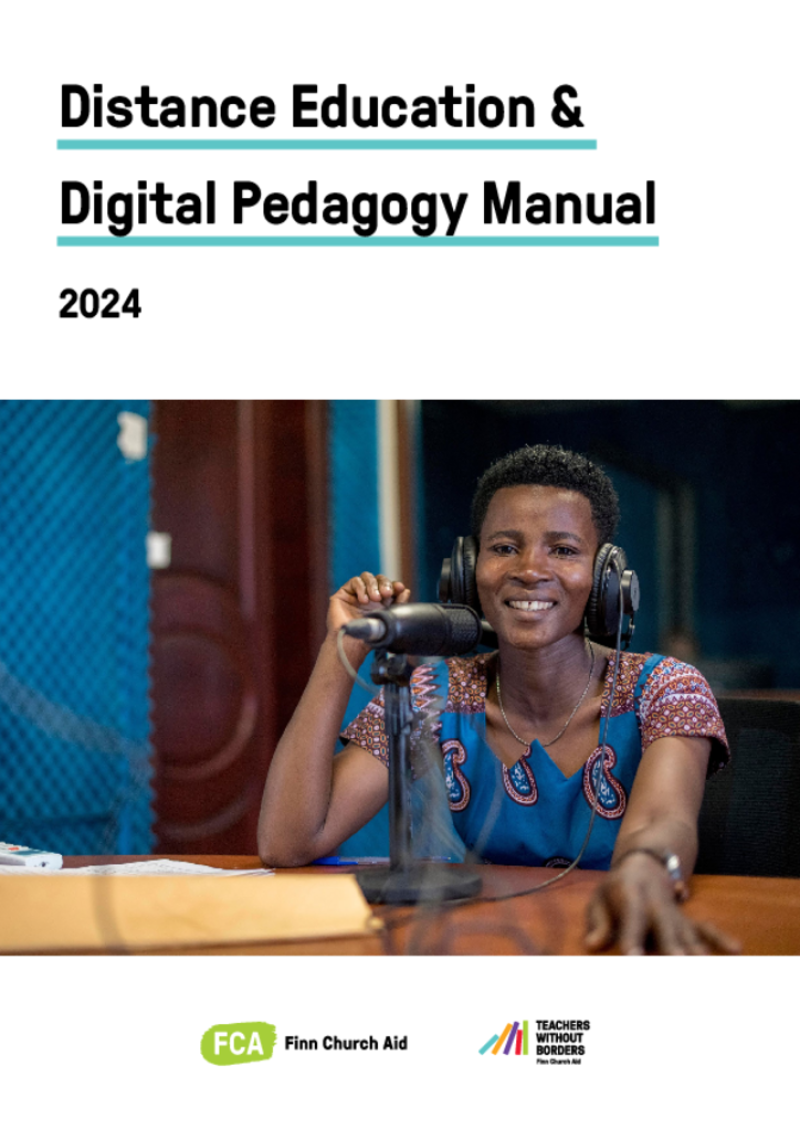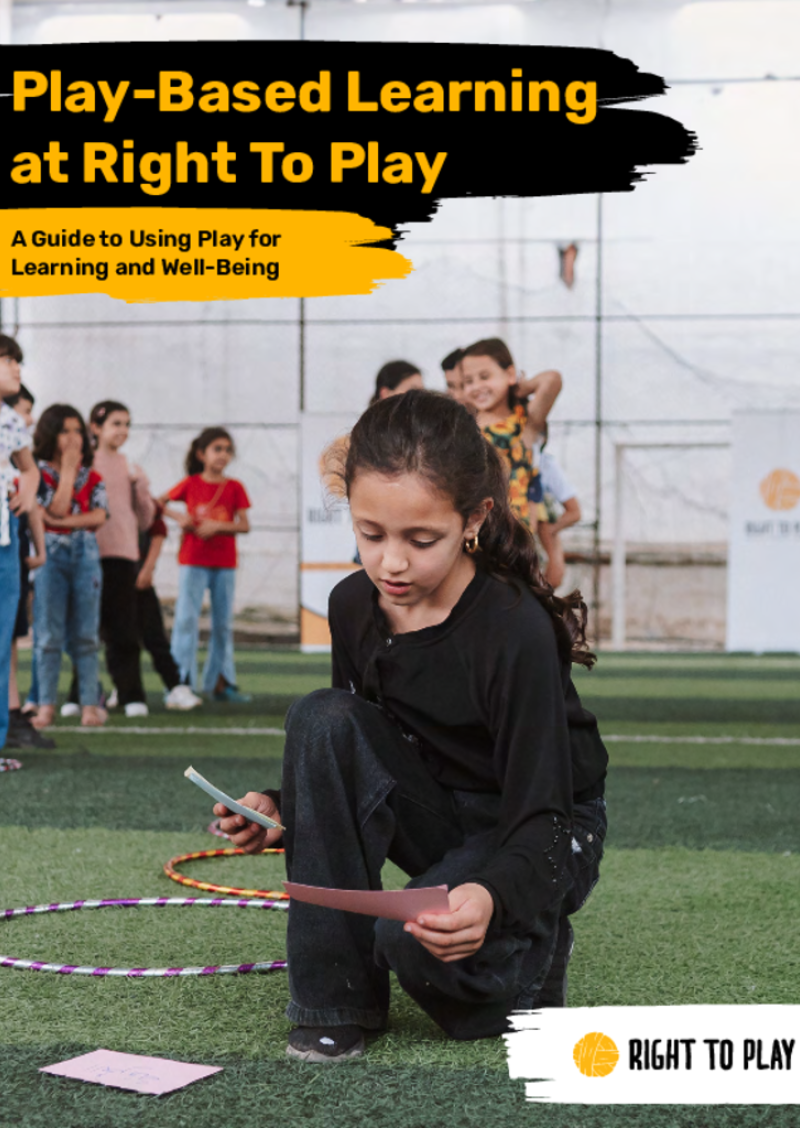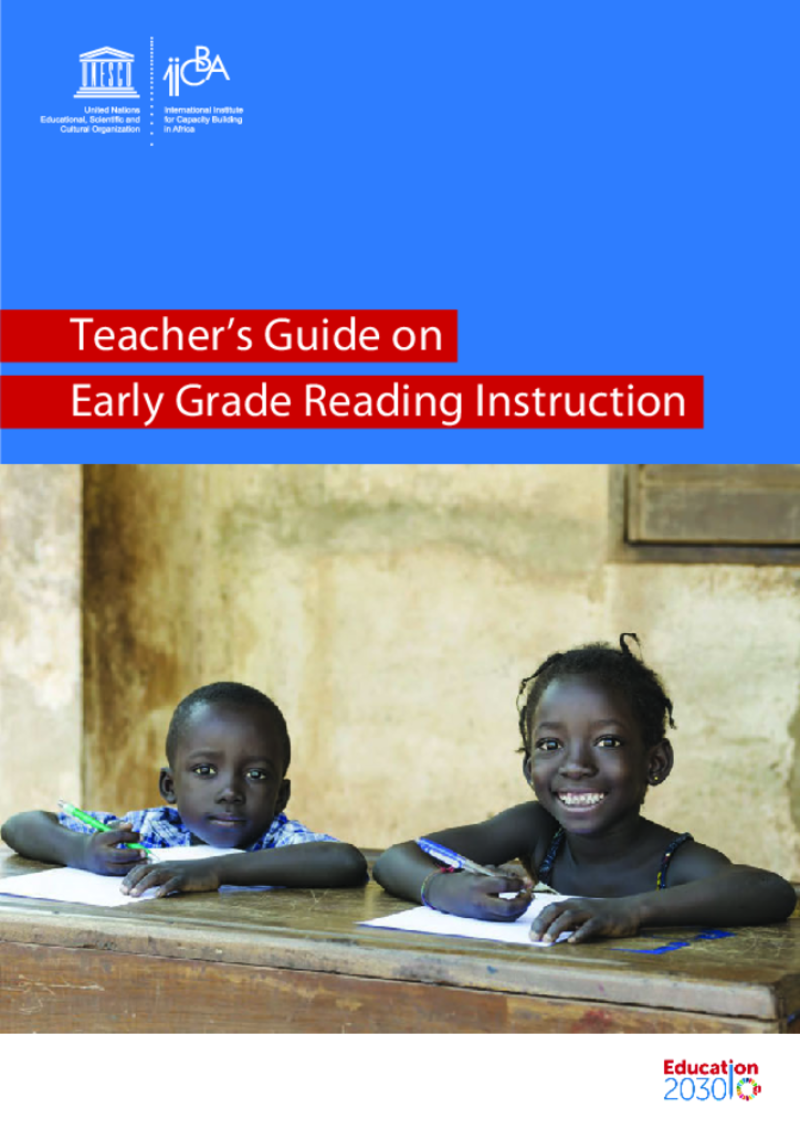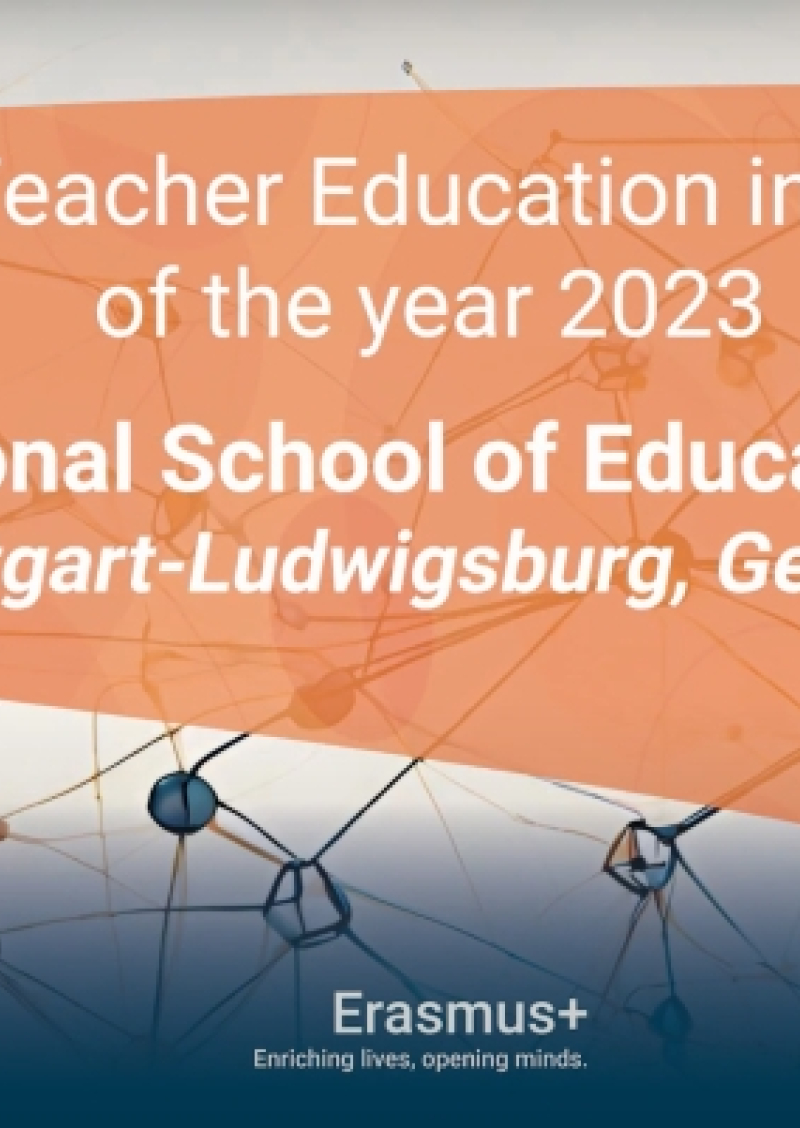Teacher Resource Centre
Displaying 1 - 20 of 57
2025 Inclusive Education Fellowship
Apply by July 11! The Inclusive Education Fellowship offers teachers and teacher coaches a unique opportunity to enhance their inclusive practices alongside fellow educators. Participants will delve into research-based methodologies such as Culturally Sustaining Pedagogy, Universal Design for Learning, and Metacognition. They will also engage in Action Research, developing projects to support learners with disabilities and learning differences. Each Fellow will plan, implement, and publish their research, and facilitate virtual learning sessions on Inclusive Education. This fellowship is part of the Global Institute Academy's annual program, aimed at transforming classrooms and communities through collective leadership and innovative teaching approaches. Of note this semester are:
-
Teacher Coaching as Collective Leadership (Morayma Jimenez & Smitha Ganesh, Teach For All)
-
Humane Education: Solutionary Frameworks for Teachers and Systems Change Agents (Dr. Julie Meltzer & Rene Neune, Institute of Humane Education)
-
Unlocking Secrets of System Leaders (Radha Ruparell, Alex Beard & Jared Hove, Teach For All)
Superstar Teacher Toolbox - Mobile Messaging for Learning
This publication by the UNICEF Office of Innovation explores the transformative potential of mobile phones in education. It highlights how mobile devices, particularly messaging platforms, have become essential tools for learning continuity and accessibility. The guide emphasizes the role of teachers in advocating mobile learning, outlines pedagogical strategies for message-based teaching, and addresses ethical considerations, planning, and content creation. By leveraging mobile connectivity, educators can foster inclusive, flexible, and impactful learning experiences across diverse contexts.
Superstar Teacher Toolbox - Digital Pedagogy
This resource part of UNICEF’s Superstar Teachers Toolbox, empowers educators to integrate technology meaningfully into their teaching. Designed for both novice and tech-savvy teachers, it offers practical strategies for planning and implementing digital pedagogy. The guide emphasizes learner-centered approaches, strategic use of digital tools, and pedagogical priorities. Structured into three chapters -planning, implementation, and additional resources- it supports educators in enhancing student engagement, creativity, and achievement through thoughtful digital transformation in education.
La professionnalisation par l'observation et l'analyse de pratiques
Le guide propose une analyse réflexive des pratiques professionnelles pour le développement et l'amélioration de l'enseignement. Il contient six fiches-action, allant de l'analyse des pratiques et représentations sociales, au dialogue entre experience et savoir théoriques. Ces fiches peuvent être utilisés comme outil de formation initiale par des formateurs ou en autonomie par des enseignants en travail collaboratif ou en co-formation, ou par un enseignant seul en autoformation qui souhaite travailler sa pratique réflexive pour améliorer la qualité de son enseignement-apprentissage.
FCA & TWB Mental Health and Psychosocial Support Manual
THIS TEACHER TRAINING MANUAL on Mental Health and Psychosocial Support (MHPSS) is developed by Finn Church Aid (FCA) and Teachers Without Borders (TWB) Finland. The manual contains guidance and practical steps for integrating elements of psychosocial support in the teaching and learning process. It is designed to be facilitated by trainers, local educators and community workers to the benefit of teachers, children and youth.
The training manual consists of six (6) training modules that can be used flexibly. The first three (3) modules are meant for supporting the teachers' wellbeing, and the last three (3) modules are meant for the classroom support for learners' wellbeing. The modules include the following sub-topics:
- Stress and relaxation
- Compassion
- How to identify and support learners with MHPSS concerns as a teacher
- Recreational activities for MHPSS
- Social and emotional learning
- Life skills
The content design allows you to pick individual modules or sessions and adapt the training content according to the context’s needs. We hope you find it useful!
FCA & TWB Inclusive Education Manual
This Teacher Training Manual on Inclusive Education supports teachers and other education personnel’s continuous professional development in inclusive, quality education especially in diverse low resource contexts and is adaptable for use anywhere in the world. The Inclusive Education Manual directly contributes to realization of several targets of the Agenda 2030 Sustainable Development Goal (SDG) 4 “ensuring inclusive and equitable quality education for all”.
The manual was developed by Finn Church Aid (FCA) and Teachers Without Borders (TWB) Network Finland. The content has been collected and built on the numerous good materials and practices used and co-developed by FCA staff and TWB education experts in different countries and contexts.
The training manual consists of three (3) training modules that can be used flexibly:
- Education, Teacher and School Community,
- Inclusive Education, and
- Positive Classroom and Learning Environment for All Learners.
The content design allows the trainer or facilitator to pick individual modules or sessions and adapt the training content according to the context and target group’s needs.
We hope you find it useful!
FCA & TWB Distance Education & Digital Pedagogy Manual
This teacher training manual on Distance Education & Digital Pedagogy supports teachers and other education personnel’s continuous professional development in pedagogically high-quality distance education and remote learning especially in diverse, low resource contexts and is adaptable for use anywhere in the world.
The manual has been developed by Finn Church Aid (FCA) and Teachers Without Borders (TWB) Finland. The development of the training materials began already in 2020 as a response to the school lock-down situations caused by the COVID-19 pandemic, when teachers and learners quickly had to adapt to remote education modalities. Even though the pandemic has subsided, the need for quality distance education prevails. Ensuring the continuity of learning for all learners is critical in all contexts, even and especially during crisis situations.
The training manual consists of eight (8) training modules that can be used flexibly:
- Distance Education,
- Distance Education Modalities,
- Pedagogy of Digital and Distance Education,
- Psychosocial and Emotional Wellbeing,
- Learner-Centred Methods in Distance Education,
- Home Support – Parents and Caregivers’ Role and Collaboration,
- Inclusive Education, and
- Assessment and Evaluation.
The content design allows the trainer or facilitator to pick individual modules or sessions and adapt the training content according to the context and target group’s needs.
We hope you find it useful!
Unlocking Potential: How Generative AI Can Help Enhance Career Readiness
Generative AI has the potential to make career education more accessible and impactful by offering personalized guidance and automating routine tasks. By leveraging AI, educators can design more efficient, tailored learning experiences, ensuring that every student—regardless of background—has access to the knowledge, tools, and opportunities they need to prepare for future success.
Join us on October 29th at 2:00pm GMT, as Sumit shares insights from his action research on how Generative AI can enhance career readiness for students from underserved communities, highlighting how one can leverage technology like GenAI to bridge educational gaps and equip students with the skills needed to thrive in future careers.
Register here
A Guide to Using Play for Learning and Well-Being
Right To Play uses a variety of approaches to play to support children’s learning, development, and well-being, including sports, music, theatre, art, and play-based learning.
This document focuses on the play-based learning methodology and approach, and how it can be used for learning and development goals related to Right To Play’s core programmatic areas: early childhood care and education, primary education, gender equality and girls’ well-being, and psycho-social support.
Play & resilience: a toolkit for teachers, caregivers, and other stakeholders
Play is an easy, natural and universal practice that builds resilience. Play comes naturally to all children- and is a seemingly simple and light-hearted phenomenon. The power of play as a pathway to building resilience needs to be leveraged to provide children with the opportunity to further explore play in their home and school environments.
This toolkit is therefore premised on the objectives to build the capacity of various stakeholders such as caregivers/teachers, school managers, curriculum planners and policy makers who are key actors in the process of growth and development of children. It is also aimed at equipping these stakeholders with the knowledge and pedagogical skills to translate research, policy and curriculum to practical knowledge and activities for children in the school environment. The toolkit offers directions for facilitators who will be working with caregivers/teachers using the materials and resources provided and other relevant materials available in an environment where it will be used.
Teacher's guide on early grade reading instruction
Reading is a fundamental ability for all other learning activities. Students can learn only when they comprehend, and this requires appropriate reading skills in the first place. Appropriate reading skills support the learning of increasing amounts of instructional content. This is why children who fail to learn to read during their early years of schooling will encounter more difficulties in later grades and a higher risk of drop out. Quality early grade reading instruction is critical in preventing these challenges and risks as well as in protecting children’s rights to education and ensuring better chances of success in their life.
Teachers are at the center of reading instruction and they need to be trained with pedagogical knowledge and management skills in order to provide students relevant and quality instruction. It has however been noted that teachers in many countries, especially low-income countries in sub-Saharan Africa, lack the proper training and support on ways of teaching early grade reading to their students. Therefore, a comprehensive and practical guide on early grade reading is highly needed to bridge this gap.
This guide aims to empower teachers in Africa by equipping them with the knowledge and skills of early grade reading, including the simple identification of the main pillars of reading, lesson planning and classroom management, taking into account the context in Africa. Subsequently, these teachers will help their students build basic reading skills in their early years of schooling.
A Teacher's Guide for Arts, Music and Drama in Africa
Art, music and drama have had a pivotal role in the livelihood of human beings. This is clear by the wealth of literature, architecture, fine art, theater and music that define human past, present and future. The inherent creative ability and a yearning to express ourselves is what gives value to art, music and drama as companion components in human evolution.
This teacher's guide covers art, music, dance, drama, experiential learning, community engagement, and how to integrate these aspects into curriculum. Additionally, this document provides lesson plans for primary school students in these subject areas.
Enseigner et apprendre le français au primaire - Conception et fabrication de dix matériels didactiques pour le français au primaire
Les dix matériels présentés dans ce guide ont été conçus par des formateurs d’enseignants de la République de Guinée dans le cadre du programme Apprendre. On retrouve ici une description de la conception, la fabrication et l’utilisation de ces matériels en classe auprès des élèves. Ils permettent d’aborder l’apprentissage du français de manière ludique et adaptée au primaire.
Comment enseigner à des enfants handicapés dans les écoles ordinaires
Ce kit de ressource a été développé dans le cadre du programme Apprendre mis en œuvre par l’Agence française de développement et l’Agence Universitaire de la Francophonie. Ce document est conçu pour être utilisé dans des contextes éducatifs en Afrique de l’Ouest. Il fournit à l’enseignant des outils afin de comprendre les besoins des enfants en situation de handicap ainsi que des ressources pédagogiques sur lesquelles l’enseignant pourra s’appuyer pour répondre au mieux aux besoins de tous et toutes.
A course for the ages: project-based learning with eTwinning/Erasmus+ for interculturality
In the blended-learning course, guest speakers such as eTwinning moderators and ITE ambassadors from Germany and Europe give motivating talks to the student teachers about their experiences. The course meets via Zoom once a week for 90 minutes. All the classwork and learning activities take place via a Moodle classroom, so students don’t travel anywhere.
This course won the eTwinning for future teachers – European Award for Initial Teacher Education and they are seeking to share their course with other Initial Teacher Education institutions. Access an OER syllabus for the course here.
For more information about the course, taking part in projects, registering for the October 2024 Stuttgart University course or becoming a guest speaker, please contact Professor Richard Powers at richard.powers@ilw.uni-stuttgart.de
Link for syllabus: https://drive.google.com/file/d/1mi2qveVC3AZf33YJlB2P9AlO9-vrGREC/view?usp=drive_link
Free webinar: International Trends in Open and Distance Education
Massey University and Open Polytechnic present a free webinar with ICDE Secretary General, Torunn Gjelsvik. The Secretary General will discuss international trends in distance and open education related to access, equity and scalability. Dr Mark Nichols from Open Polytechnic, the President of ICDE, will also join the conversation, together with Professor Giselle Byrnes, Provost of Massey University. There will be an opportunity for questions at the end of the session
